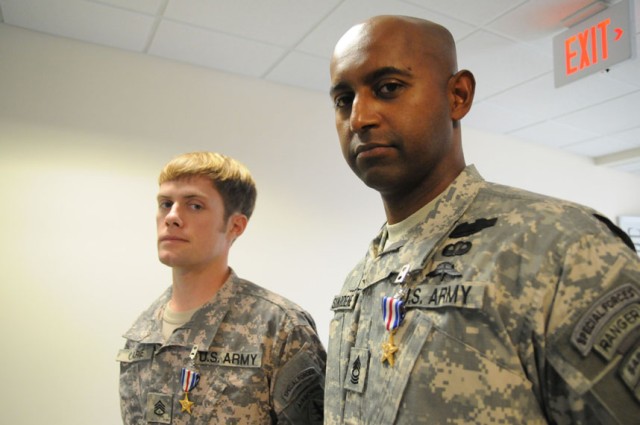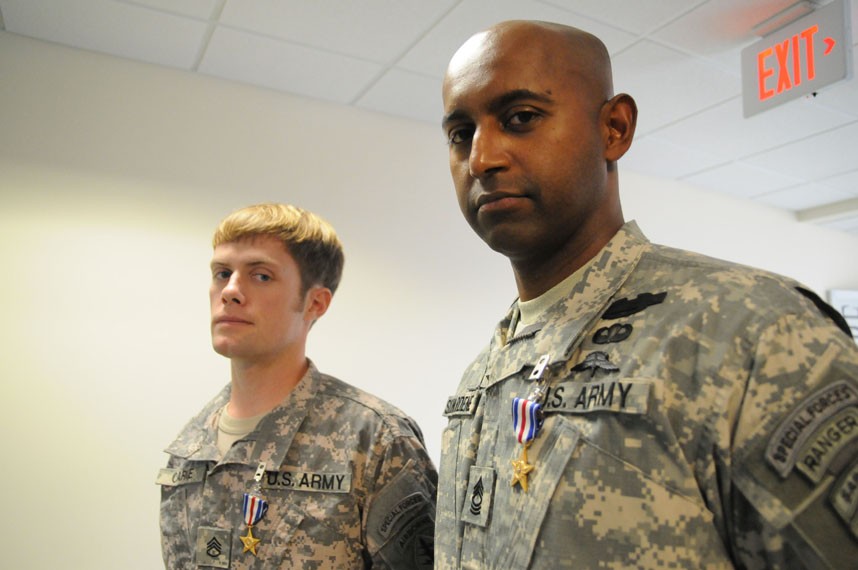FORT BRAGG, N.C. - Forty-three Soldiers from 3rd Special Forces Group were recognized for valorous actions" in combat during an awards ceremony at the U.S. Army John F. Kennedy Special Warfare Center and School Wednesday.
Lt. Gen. John Mulholland Jr. and Col. Gus Benton II presented two Silver Stars, 10 Bronze Stars with Valor devices, six Purple Hearts and 25 Army Commendation Medals with Valor devices. Brig. Gen. Michael Repass was also in attendance.
Mulholland is the commander of U.S. Army Special Operations Command; Repass is the commander of U.S. Army Special Forces Command; and Benton is the commander of 3rd SFG.
"The phrase 'uncommon valor was a common virtue' was used to describe the Marines at Iwo Jima, but I certainly believe those words could be applied to the these men we honor here today," said Mulholland.
Receiving the Silver Star, the nation's third highest military decoration, were Master Sgt. Anthony M. Siriwardene and Staff Sgt. Linsey W. Clarke. Even though the two Soldiers did not know one another before the ceremony, they have many things in common. Both grew up in Virginia and said they joined Special Forces to be the best. Also, neither believes he deserves the Silver Star or to be called a hero.
Siriwardene earned the medal during 54 hours of fierce combat against enemy militants in Afghanistan in 2005. Clarke earned his medal during a deadly engagement against enemy fighters, also in Afghanistan, this year.
"It's like I always say, 'There are no heroes in combat - just survivors.' No one rises to the occasion during battle; you just fall back on training," said Siriwardene, a combat engineer by trade.
The master sergeant came to the United States from Sri Lanka with his Family when he was 8 years old. He joined the Army when he was 24 because he felt obligated "to give something back to his country" for the opportunities he had been given as he grew into an adult.
"I knew from the start that if I was going to do something, I was going to be the best," Siriwardene explained. "That's why I wanted to go to Ranger School and then became a part of Special Forces."
He said being a Special Forces Soldier forced him to be the best he could be every single day.
"Being the best is just the baseline," he added. "These guys strive for perfection in everything they do. That makes me want to do the same."
This desire to be the best, combined with years of special warfare training, helped Siriwardene perform gallantly during seven back-to-back battles from Aug. 7 to 9, 2005. He and his Soldiers from Operational Detachment Alpha-316, Special Operations Task Force-31 suppressed the advances of enemy combatants in several of Afghanistan's treacherous valleys.
His award citation reads, "Sergeant Siriwardene's personal courage and commitment to mission accomplishment in a combat zone, under the most extreme of circumstances, greatly contributed to the success of Operation Enduring Freedom."
But, according to the master sergeant, he was just doing what he was trained to do, and without his fellow Soldiers, he would never have been able to accomplish the heroic feats he performed throughout those 54 hours.
During a separate interview, Clarke shared this same sentiment. The 26-year-old combat medic called the experience of receiving a Silver Star "humbling."
"Honestly, I don't feel like I deserve this," the graduate of James Madison University said. "I mean if I should get it, so should all of my teammates because I couldn't have done anything without them."
During a joint reconnaissance patrol, an improvised explosive device destroyed the rear ground mobility vehicle in Clarke's convoy. Three of the vehicle's crewmembers were killed, and the entire patrol began to receive heavy and small-arms fire. It was at this time that Clarke said his training as a Special Forces medic kicked in. He began assessing wounded Soldiers' conditions and evacuating them to safe areas as far from the kill zone as possible.
Clarke helped to provide security until support arrived, which he estimated to be about 20 minutes. During this time, he and his fellow Soldiers were receiving heavy fire.
"As I was dragging people away, I could hear the rounds cracking and snapping all around me," he said. "I don't know how close they came to me, but I knew they were pretty close."
Clarke said he never thought twice about doing what he did.
"We are a close team. I know that any one of them would have done the exact same thing for me," Clarke explained. "I was just at the right place at the right time to help."
However impressive his award citation reads, Clarke is hesitant to admit that his actions warrant a Silver Star. He said he is not accepting the medal for himself, but for his entire team.
"I wish everyone who was there that day could've been up on the stage with me," he said. "They all deserve it just as much as I do."


Social Sharing